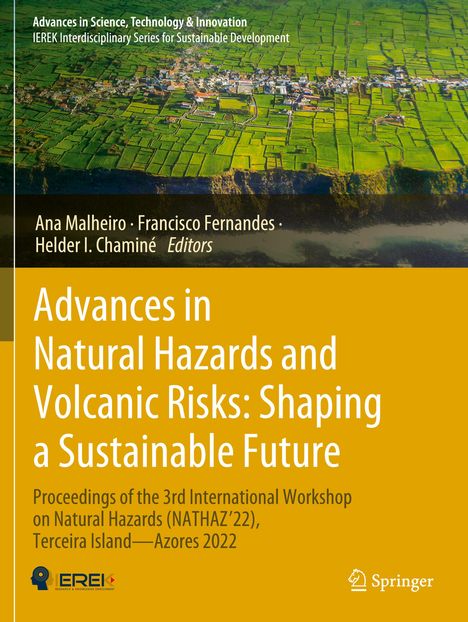Advances in Natural Hazards and Volcanic Risks: Shaping a Sustainable Future, Kartoniert / Broschiert
Advances in Natural Hazards and Volcanic Risks: Shaping a Sustainable Future
Buch
- Proceedings of the 3rd International Workshop on Natural Hazards (NATHAZ'22), Terceira Island-Azores 2022
lieferbar innerhalb 2-3 Wochen
(soweit verfügbar beim Lieferanten)
(soweit verfügbar beim Lieferanten)
Aktueller Preis: EUR 273,80
- Herausgeber:
- Ana Malheiro, Helder I. Chaminé, Francisco Fernandes
- Verlag:
- Springer Nature Switzerland, 05/2024
- Einband:
- Kartoniert / Broschiert, Paperback
- Sprache:
- Englisch
- ISBN-13:
- 9783031250446
- Artikelnummer:
- 11862511
- Umfang:
- 252 Seiten
- Nummer der Auflage:
- 2023
- Ausgabe:
- 2023
- Gewicht:
- 697 g
- Maße:
- 279 x 210 mm
- Stärke:
- 11 mm
- Erscheinungstermin:
- 8.5.2024
- Hinweis
-
Achtung: Artikel ist nicht in deutscher Sprache!
Weitere Ausgaben von Advances in Natural Hazards and Volcanic Risks: Shaping a Sustainable Future |
Preis |
|---|
Klappentext
This book comprises the selected proceedings of the 3rd International Workshop on Natural Hazards (NATHAZ 22), Angra do Heroísmo, Terceira Island, Azores, 2022. The book interests all researchers and practitioners in Earth Sciences, Volcanic Risks, Natural Hazards, Geoethics, Environmental Sciences and Engineering.Terceira is a volcanic island with volcanic systems with caldera (Cinco Picos, Guilherme Moniz, Santa Bárbara and Pico Alto central volcanoes) and an active fissural zone defined by various alignments of small volcanic cones, lava domes and fault zones. The agricultural landscape, the natural and forest reserve, as well as the natural pools make the island a unique place to visit. The historic downtown of Angra do Heroísmo is a UNESCO world heritage, and several iconic buildings witness the island s geodynamic history.
Natural hazards result from a threat of a naturally occurring event that will have a negative effect on humans. That damaging effect is often called natural disasters. Among the natural hazards and potential disasters to be considered are: earthquakes, volcanic eruptions, landslides, subsidence, floods, droughts and coastal erosion. In addition, anthropogenic hazards occur as a result of human interaction with the environment. They comprise technological risks due to exposure to hazardous substances in the environment.
Natural systems in different frameworks require a comprehensive understanding of climatology, geology, hydrology and volcanic data, processes and dynamics. Thus, it is important to perform hazard and risk assessment studies to accomplish hazard mitigation. In addition, it highlighted the role of variability and climate change in Earth systems. Furthermore, an accurate understanding of the natural systems and interactions with engineering, geodiversity and natural resources is vital to the entire socioeconomic sector.
This book is expected to offer an overview of natural hazards in model regions in Europe, America, Asia and the Atlantic islands. It gives new insights into the characterization, assessment, protection, and modelling of geological hazards, volcanic systems, urban areas, coastal zones and engineering approaches by international researchers and professionals. The scientific committee comprises lead geoscientists, natural hazards related practitioners, and academics worldwide.
The main topics include:
1. Multi-hazards and risks: sustainable society, disasters and geoethics
2. Natural hazards and assessment: rock falls, landslides, urban planning and management
3. Sustainable Earth systems: hazards and climate change
4. Terceira Island geology and geodiversity: meeting volcanological hazards in the Azores

Advances in Natural Hazards and Volcanic Risks: Shaping a Sustainable Future
Aktueller Preis: EUR 273,80
